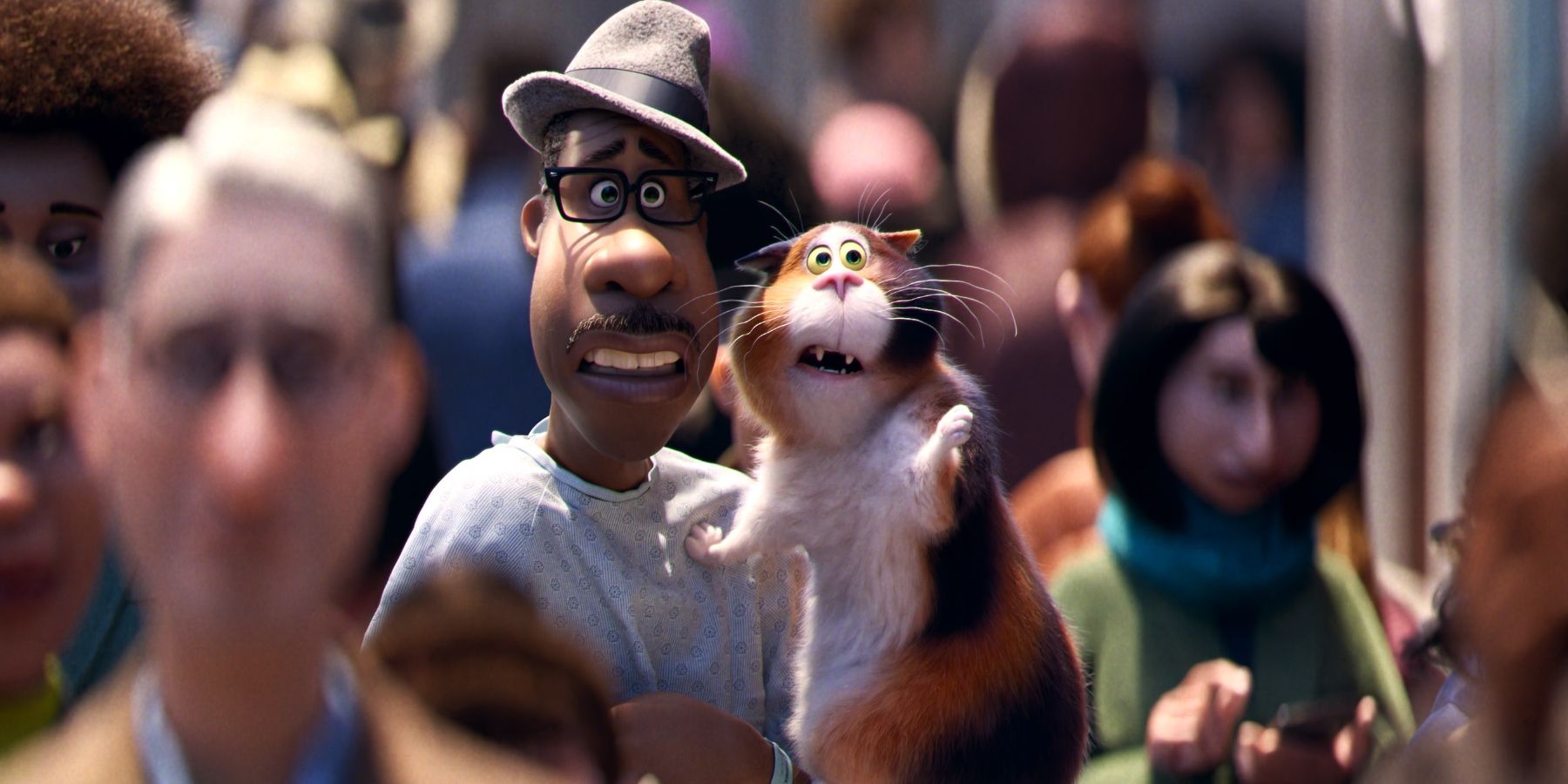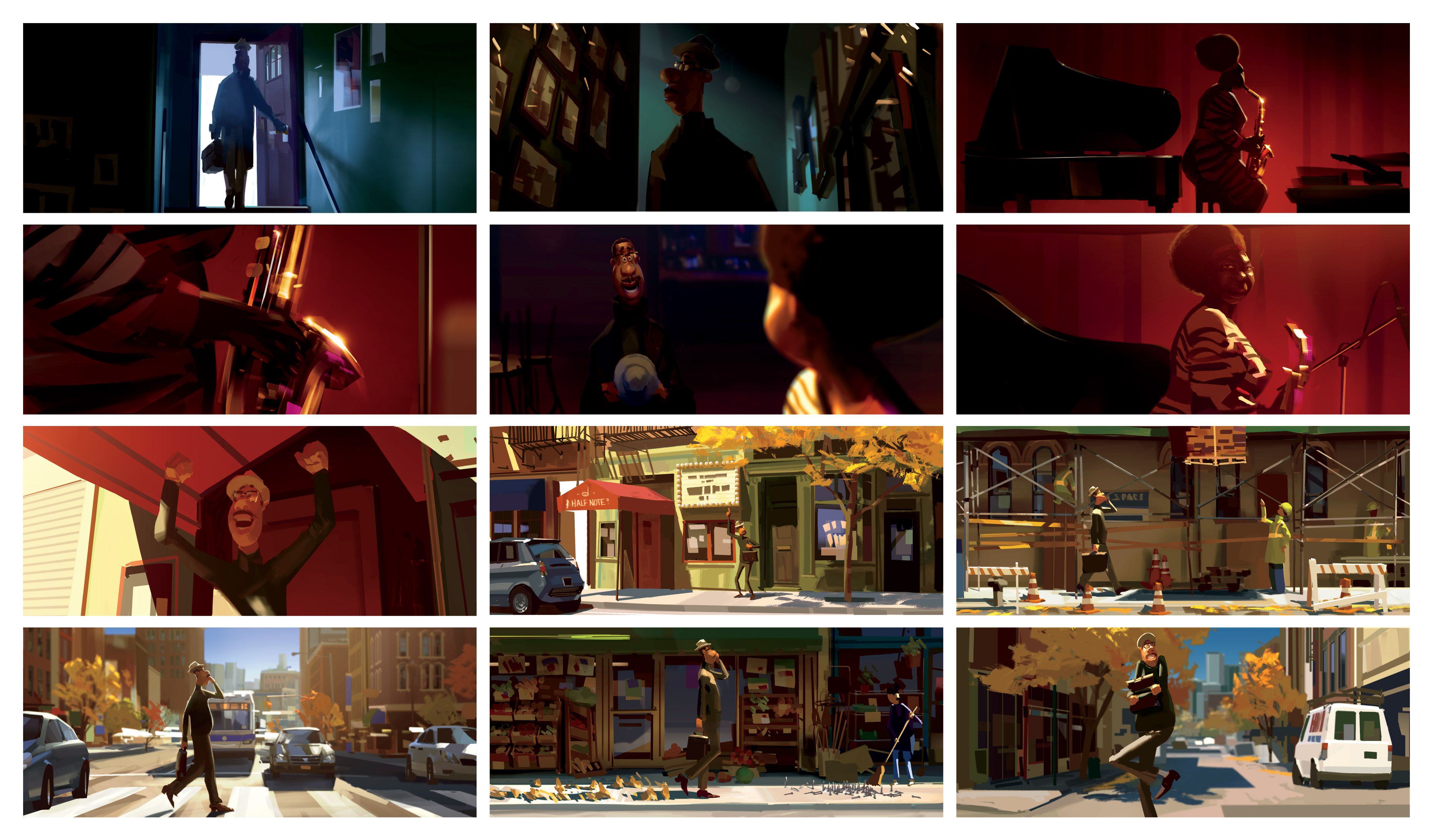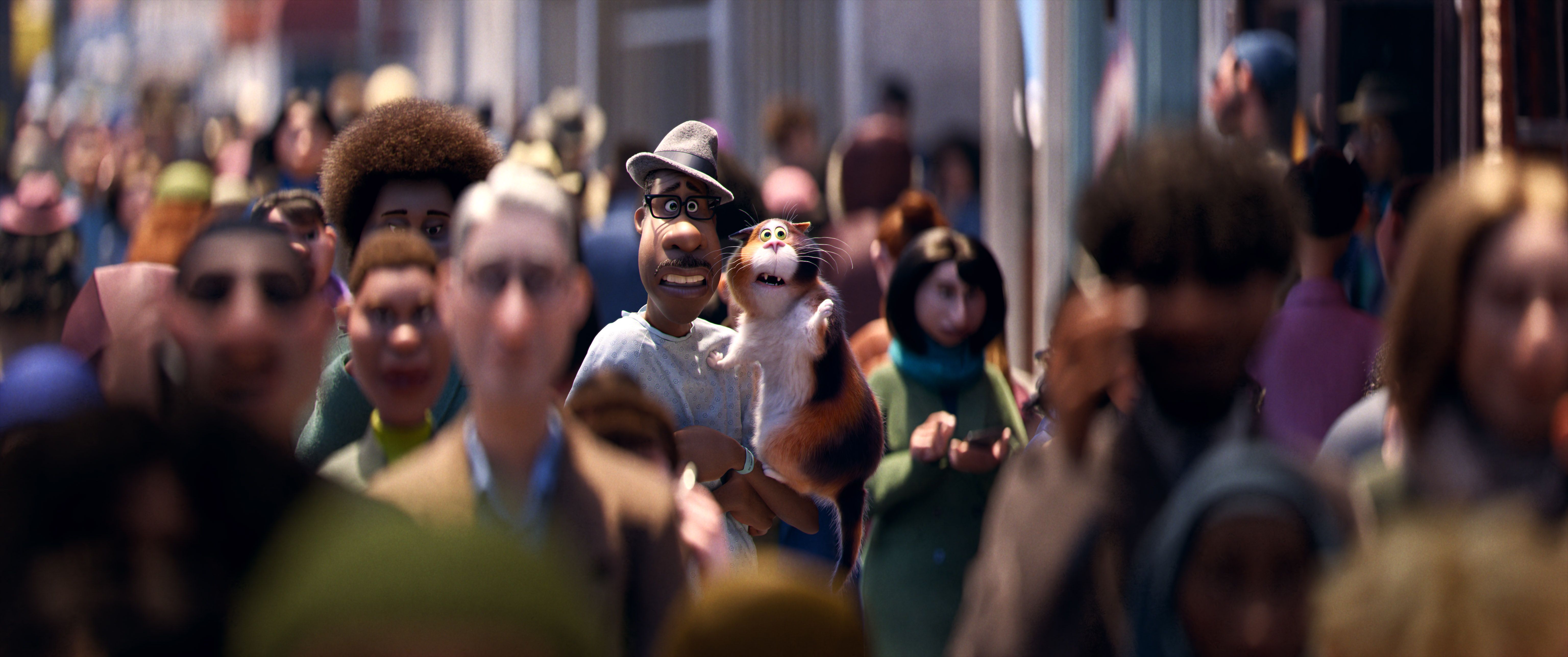Pixar’s latest masterpiece, Soul, hits Disney+ on Christmas Day. It’s the story of Joe Gardner (Jamie Foxx), a middle school band teacher who dreams of making it big as a jazz pianist. On the eve of his big break he takes a stumble down an open manhole and wakes up in The Great Beyond. Finding himself disembodied from his physical body, he embarks on an odyssey through this cosmic realm with 22 (Tina Fey), a soul who has no interest in visiting earth. Their journey takes some truly insane left-turns before winding up with a conclusion as deeply felt and heart-tugging as anything Pixar has come up with before.
A few months ago I got to chat with Kristne Lester (story supervisor), Michael Yates (story artist) and Aphton Corbin (story artist), the core story team behind this ambitious project. And they shared stories of what it was like working with co-writer/director Pete Docter, if there was anything that was too weird to be included in the movie, and how the dynamic changed after, midway through production, Docter began running Pixar. It’s also worth mentioning that at the time I had only seen the first 35/40 minutes of Soul, so you don’t have to worry about spoilers – at the time I conducted the interview I didn’t even know what the movie was really about!
Collider: Pete has described the movie as being pretty amorphous in the early days. I was wondering when you came onboard Soul and what shape it was in then.
KRISTEN LESTER: I came on as a supervisor. I came on pretty early. I came on when the project was still in development. I think when I came on, I don't even think there was a script yet from what I can remember. It was just Pete pitching an idea to people and that's where it was when I came on.
APHTON CORBIN: I came on on the third screening. I was wrapping up Toy Story 4. I had seen the screening, they show it to the entire story team at Pixar, and so I remember going into the theater and seeing Joe dying and being like, "Oh, my God. What are we about to make? This is so crazy," and just being really excited and horrified at what we're about to do and just seeing where we were going to take this thing.
MICHAEL YATES: Yeah. I think I came on similar time as Afton, and I did watch it previous to that though. And then I just remember thinking, "Wow, good luck to those guys."
LESTER: Also Drew, by the way, I'm finding all of this out in retrospect.
CORBIN: Yeah. I was like, "Good luck to that," but yeah. Now we're here.
What was this most daunting aspect of this production? It sounds like everything is the answer to that, but individually from your point of view, what was the hardest thing to get a handle on?
LESTER: For me personally, gosh, yeah, everything is the right answer. Visualizing a world we'd never been to before, that we have no idea what that looks like, that is totally not based in reality. I think also doing honor to the subject matter and the themes that it was discussing, doing that in a really fun and entertaining way without it being like we were sitting down and giving everybody a lesson; telling it in like a fun, entertaining way that people were engaged with. Gosh, the list goes on and on and on.
YATES: For me, another big part of it was just this being Pixar's first black lead and just making sure that that felt authentic and that we did that responsibly so looking back on it after the film comes out, I can feel proud about that. That was a big thing for me.
CORBIN: Yeah. Just everything they said basically. All of those things.
Pete has talked about how, at point during the development, the entire movie took place in the soul world and that now it's 50-50. Can you talk about what that process was like? And he brought up this insane concept that it was a heist movie at one point, so maybe you can speak to that.
LESTER: Yeah, yeah, yeah. All our movies take very different paths and you'd be shocked at what you saw when stuff was early in development to where it ended up being. Sometimes they're very, very, very different movies and yeah, the first sketch of the movie, it was more of a heist movie that Joe was trying to go back to his life basically through, I can't remember, doing a bunch of heist-y stuff. And I remember we came to the end of that version of the movie and it just felt like, again, like I talked about, doing honor to the subject matter and the thing that it was exploring, which is what gives life meaning, what is our purpose in life? The questions that Pete was answering. And it felt like that version of the movie wasn't doing that justice, and so we had to take out... Okay, it's not Ocean's 11. What can we do to dig deeper into the thing that people really wanted to talk about?
Pixar should still make an Ocean’s 11 movie.
LESTER: I agree. I agree. I feel like you could go through all the detritus of other movies and there's just a million great movies still in there.
In the first 30 minutes there is a lot of stuff, about how the soul world works and the different strata of that world. How hard was it from a story point to get through all of that insane world-building in a way that is easily digestible and doesn't gum up the story in a way?
CORBIN: Yeah, we were trying to introduce a lot of concepts in a short amount of time, and it was a lot of us finding ways to still make things entertaining while you're getting exposition and finding ways to... How much do you really not need and just let the audience enjoy how crazy and whimsical things are? And I remember the moment when Pete introduced the idea of having that little You Seminar video and the humor of, "Welcome to the You Seminar," and that being a huge, Oh, great, okay. There's some more exposition for free. But then also just letting some stuff just go unexplained. I think that was a new risk for us of Joe just starts falling and there's all these different lines and colors vibrating and it's just going to happen and we're all going to go on this crazy adventure. The more we explain stuff, the less ethereal it is and just having some faith there as well.
Was there anything that any of you pitched that was too crazy for this movie?
CORBIN: There's a lot of crazy stuff that was pitched. I don't know.
LESTER: To me, the biggest challenge was, again, sometimes as story artists we can be very literal in what we're doing, and this movie was so challenging because it was so ethereal that we couldn't rely on the old tools that we had. And I remember one time there was an idea where Joe and 22 were trying to sneak through the You Seminar and pretend to be counselors, and so, the old story trick is that it's like, okay, it's two people stuffed into a coat. They were walking around in an overcoat standing on top of each other pretending to be counselors, and we watched that and we were like, "That isn't really believable, is it?" There's a lot of stuff like that.
CORBIN: A lot of the crazy stuff that we pitched ended up in there. Maybe one joke that we thought wasn't going to make it in there, a joke with one of the Jerrys. And then it just kept staying and staying and we're like, “It's going to get in there. We have to live with this,” which is fun. It was fun to see how much weird stuff and when was it too far? When did it go?
LESTER: There were so many scenes on this movie where a story artist would pitch something and they were so great because you could hear the room when they pitched. Half of the room would be like, "Ohhhh," and half of the room would be like, "Ohhhhh." There are always these great moments of someone would pitch something and we'd be like, "Wow, can we do that? Should we do that? Let's do that."
CORBIN: No one's telling us not to.
LESTER: No one's telling us not to, yeah.
CORBIN: With the Jerrys and them being a line, I remember the wave of excitement of, "Oh my God, they can be just a line," and the technical directors being like, "Cool. All right. How are we supposed to build any of this?"
LESTER: I definitely had moments where somebody would pitch one of these ideas that was really out-there and we would cut it into a reel and we would screen it. And we would be in the theater, we would be watching it and I would hold onto the handles of my seat and just be like, "This is so crazy and great. I don't even know what to do with myself." It was really funny.
During production of Soul, Pete assumed this role of running the entire studio. Was his attention split in a way? Was it harder to get him on board certain things? How did that work out for the production?
CORBIN: Yeah. We remember they announced it to the entire studio, including the Soul team. They're like, "Oh, that's new and cool. All right." But Pete did a really good job of multitasking despite the fact and he's very passionate about this project. I think that he wanted to see this thing through, and then we had a lot of help from Kristin. She stepped up and helped to be that middleman for those moments when Pete had to be out. And yeah, it was just multitasking at its finest.
LESTER: Yeah. He was a busy man, but he's so passionate and committed. Literally, I think somehow, some way, he gives 100% to each job. He must get a lot of sleep or I don't know where all his energy comes from, but it's got to come from somewhere.
CORBIN: And he still finds a way to get to the gym at six in the morning. I'd see him at the gym in the morning working out and like, "Man, Aphton. You have no excuse. Get up."
Pixar’s Soul premieres exclusively on Disney+ on Christmas Day. And we’ll have plenty more from the movie before then.



